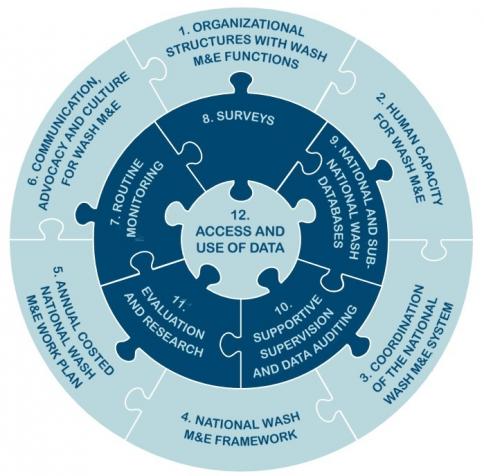This blog has originally been posted on ircwash.org.
Strengthening monitoring and evaluation systems in the WASH sector in Western and Central Africa.
IRC is working with UNICEF, Akvo, and the Dutch government (DGIS) to support nine countries in West and Central Africa to strengthen the tracking and evaluation of progress on national water and sanitation goals. Improving water and sanitation services begins with knowledge about the state of services and the required level of service. This knowledge is not easy to maintain on regular basis and thus countries can find it challenging to act on the basis of recent data.
In this programme, governments and stakeholders are working together assessing the national monitoring and evaluation (M&E) systems, including the definitions of a good ‘service’. Together, the partners will define and cost the actions required to link monitoring data and research on water and sanitation to actual improvements in the state of infrastructure and the water and sanitation services received.
Western and Central Africa
The programme takes place in countries with existing monitoring systems and where the government have requested support from UNICEF, Akvo and IRC for strengthening these M&E systems and tools. The programme is an activity within the larger UNICEF-led Western and Central Africa 9-country programme supported by DGIS. The identified needs of governments in this region will also guide the work by Akvo in this programme on improving their open source monitoring software, which is currently in use in the region. IRC and programme partners have developed a set of assessment and facilitation tools in English and French for working with country governments and stakeholders to strengthen national WASH M&E systems in the region. While the programme scope is Western and Central Africa, the tools are global in nature.
However, as the purpose of the project is to accelerate and strengthen national M&E so that WASH services and asset management improve, this programme will focus on the use of data at the sub-national level and where services are delivered in districts and communities.
National WASH monitoring and evaluation system
The foundation of the tools is an organizing framework describing the parts of a well-functioning national WASH M&E system. The framework defines three interlinked areas required for a well-functioning national M&E system:
- People, partnership and planning.
- Collecting, verifying and analysing data.
- Using data for decision making.
These areas are made up of 12 components in total as shown in the figure below. The outer circle contains the six soft components on people, partnerships and planning. The middle circle depicts the five technical components. The centre of the circle is the ultimate target: the use of data to improve services.

This framework is an adaptation of a well-established framework developed by M&E professionals in other sectors, most notably by UNAIDS for strengthening national HIV monitoring systems.
